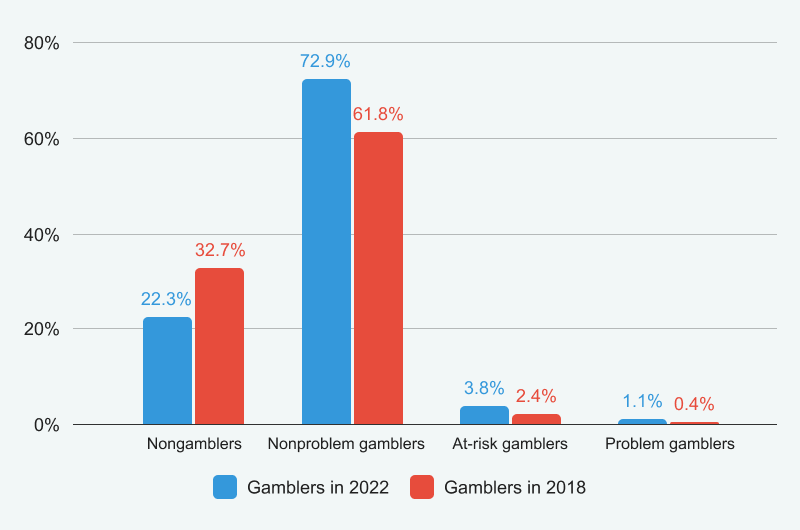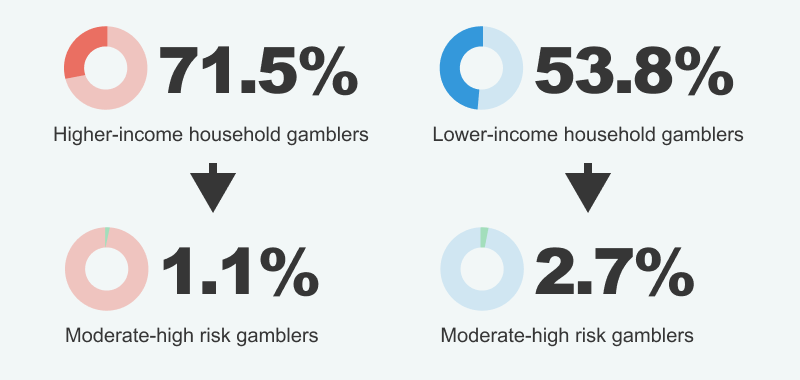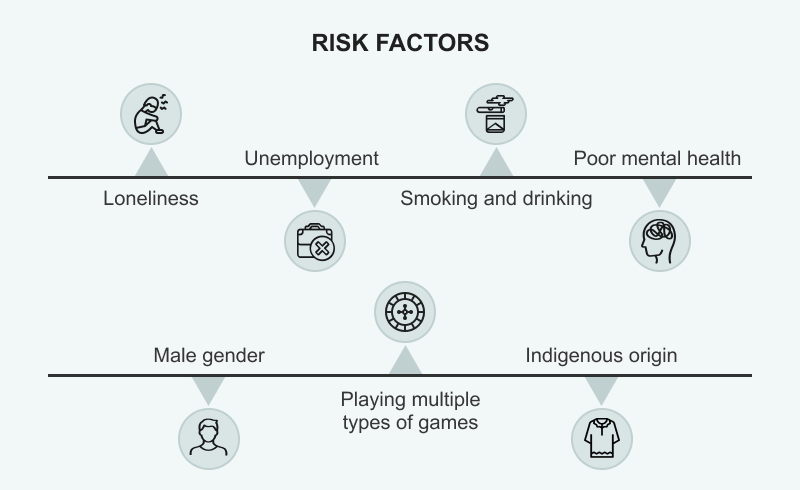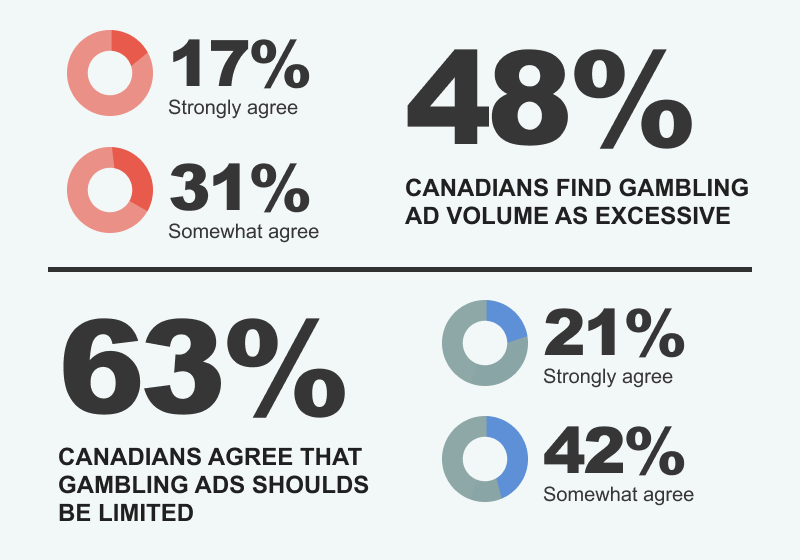Gambling
Gambling Statistics in Canada: Market Insights and Risk of Gambling Problems

A study from the year 2000, when online gambling was still relatively new, says that at the time, there was a lot of commotion regarding online gambling being considered more likely to induce addiction. The reasons are the availability of casino games from the comfort of home and particularly the impact on younger gamblers as they embrace internet technology in their daily lives. The same study notes that in 2000, gambling issue prevalence was around 3-5% among Canadians.
A more recent report from 2018 found that 3.4% of Canadians (636,000) were at low risk for gambling-related harms, while moderate to severe risk impacts 1.6% (304,000) of the Canadian population. Meanwhile, 64.5% of Canadians admitted having gambled at least once the previous year. As a result, only a small percentage of Canadians face serious gambling-related issues.
To determine whether the convenience and accessibility of online gambling have contributed to gambling-related harm rates, we compared figures from both of these studies. We determined that problematic gambling prevalence from 2000 to 2018 hasn’t increased as in both periods it’s at a 5% rate.
Problem gamblers in Canada (data from Statistics Canada)
Another study published in the Canadian Journal of Psychiatry in 2021 reinforces our previous conclusion, presenting data that shows a decline in problem gamblers and suggests the overall landscape has improved.

Changes in gambling behaviour over time (data from National Library of Medicine)
The statistics indicate that from 2002 to 2018, there’s been a decline in gamblers by 10.4%. The non-problem gambler rate has also shrunk, but it’s explained by the overall decrease of gamblers in the country.
The key gambling stats to evaluate are the at-risk and problem gambler percentages – both have decreased by 1.4% and 0.7%, respectively. Most recent data confirms that gambling-related issues in Canada have become slightly less prevalent. However, new studies would be required to reflect on the current situation more precisely, as the latest study on this matter at the time of writing this article was conducted six years ago.
People From Low-Income Households are More Vulnerable to Gambling Problems
The prevalence of gambling addiction has a close link with socioeconomic status. Although a smaller percentage of Canadians with lower incomes gamble when compared to those who are more financially secure, there’s a connection between lower income levels and the likelihood of developing compulsive gambling habits.
A 2018 Canadian Community Health Survey has found that people from lower-income households are less likely to gamble than those from higher-income households, but they are more prone to gambling-related problems.

High-income vs low-income gamblers (data from Statistics Canada)
Of the 71.5% of Canadians from high-income households who reportedly gambled in 2018, only 1.1% were at moderate-to-severe risk for problem gambling. However, lower-income households present a different tendency – 2.7% of players out of 53.8% who gamble were at moderate-to-severe risk of gambling problems. It means that people from low-income households are almost twice as likely at risk of developing a gambling addiction.
The relation between gambling issues and low-income levels may stem from the perception of gambling as a way to improve the financial situation. In addition, higher-income individuals are more able to afford losses from gambling, so they are less affected. It’s apparent that compulsive gambling contains multi-factorial circumstances – hence, additional variables contribute to the issue.

Risk factors associated with gambling problems in Canada (data from Statistics Canada)
Other aspects associated with gambling problems are the following:
- Being single or separated results in a lack of social support and increased proneness to behaviours like excessive gambling;
- When being unemployed, gambling is used as a coping strategy;
- Daily smoking and heavy alcohol use are considered to have common addiction triggers with gambling on a neurobiological level;
- Poor mental health lowers the threshold for compulsive gambling;
- Prevalence of gambling-related problems is more common among males than females;
- People who engage in multiple forms of gambling activities are more likely to be compulsive gamblers;
- Indigenous people are three times as likely to have a moderate-to-severe risk for gambling problems due to socioeconomic factors.
We concluded that the right concurrence of certain risk factors can trigger gambling problems in individuals from risk groups. Thankfully, Canadians have a relatively stable social and economic climate, resulting in a sliver of problem gamblers. Nonetheless, new advancements and the industry evolution may present new challenges that might influence the spread of gambling harms.
Is Advertising One of the Causes of Gambling Problems
Expansion of the online gaming market has led to a surge of gambling ads, particularly online. Not only have these ads become more frequent, but they also increasingly feature influencer and celebrity endorsements. Gambling brands are trying to capitalize on such marketing opportunities, but it has raised concerns among the Canadian public.
The situation escalated with the opening of the Ontario iGaming market in April 2022. New casino brands started flooding the market and increasing ad volume. Since then, Ontario has taken action by enforcing a ban in February of 2024 on using celebrities, athletes, and social media influencers in ads to promote gambling platforms.
Meanwhile, An Ipsos survey from 2022 shows that about half of Canada’s citizens deem gambling advertising excessive. Meanwhile, the majority of Canadians agree that gambling ads should be limited.

Survey on gambling advertising (data from Ipsos)
Considering the poll results, we can assume that most Canadians don’t hold polarizing views regarding gambling ads, as only about a fifth of the respondents strongly agree with ad excessiveness and restrictions like cutbacks in volume.
The main concern with gambling advertising is that it allows operators to engage children and youth in gambling at a young age. A review by The Campaign to Ban Ads for Gambling found there is a connection between exposure to gambling ads and more positive views of gambling and increased gambling activity. In addition, evidence shows the younger population and those already vulnerable to gambling dependency are more likely to be influenced.








